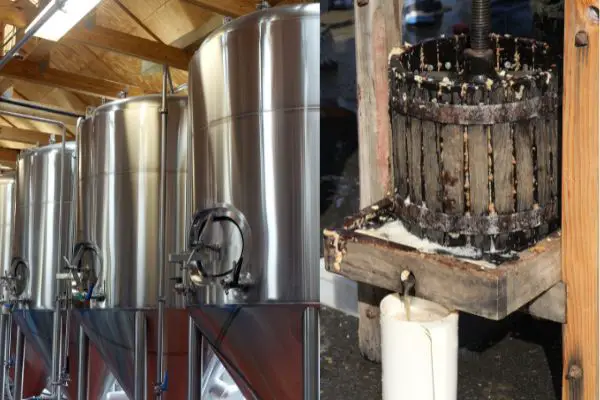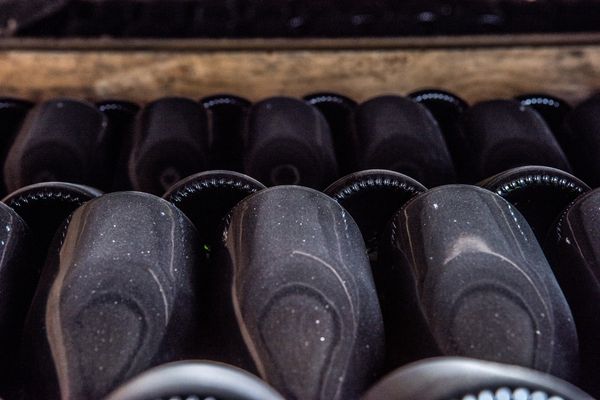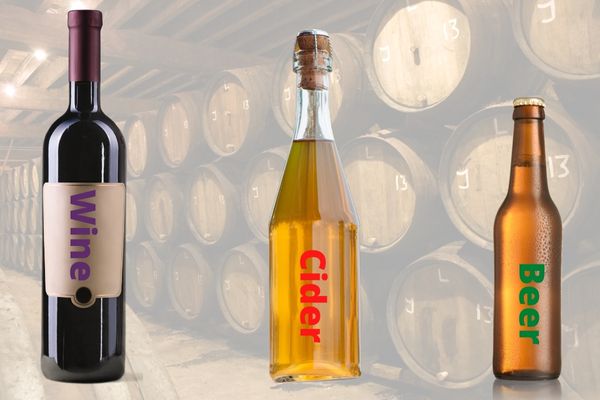You might have heard that hard cider should be stored for a few months to improve its taste before drinking. The same is the case for whine, which is often stored for years before reaching its full potential!
Here we are talking about the aging done in a separate container after fermentation and the effect will largely depend on the storage conditions and type of cider.
Generally, it does pay off to age hard cider. The stronger the cider the longer it can be stored and the better the effect of aging. Whereas some strong ciders can be aged for decades, wild-fermented ciders are often too unstable for long-term storage and should be aged for maximally a few years. But it all depends on the exact fermentation process used.
When it comes to aging cider, the process is similar to aging wine. The passing of time can turn average cider into something even better which is well worth the time.
Yet, there are some things you will want to know to get the best results without ending up with cider that becomes completely ruined. I will go through some of the most important aspects of cider aging in this blog post!
Does cider improve with age?
Yes, this is the sole intention of aging hard cider. It does, however, depend on your taste!
When you start to age cider, the most obvious result that happens is the softening of the acidic and some of the bitter notes, which brings out the more subtle fruity and sweeter aromas.
A new bottle of cider will often have a sharp narrow spectrum of tastes and smells, whereas an older cider will be broad and soft.
The strongest effect is perhaps that the level of acidity becomes mellowed out, and some people describe the process as “rounding” of the cider as the different taste components equalize.
The sweetness will be one of the components that also often prevails after long-term storage and the caramelization of sugars and lower acidity is responsible.

However, if stored for too long, and especially if oxygen can enter in small amounts, you run the risk of vinegar formation, which will definitely not “soften” the acidic tastes.
The color will also often change with time, with most ciders experiencing a darkening over time.
This improvement will have different results when aging bottle resources and oak barrels.
Additionally, the tastes of anything that is added to cider including hops are oak flakes will become more evident as time passes.
How long should I age cider?
Depending on the brewing process, cider can take a couple of weeks up to 6 months or more before it reaches its initial flavor peak. That is, it really depends on the yeast used, the length and temperature of fermentation, the types of apples, and the storage conditions.
Also, the level of carbonation will matter for the stability of the cider and, of course, the tightness of the storage container as the influx of oxygen almost always will ruin a good cider!
And most craft cider makers sell their cider after around a year of storage – just after disgorging of the cider.
After this, the aging timeframe is a question of how much time you want to wait. Some first-time home brewers might wait just a few weeks or months before they taste their long-awaited reward, while semi-pros will wait at least 6 to 9 months.
Many professionals may wait up to a full year to two years to see some dramatic changes to the flavor profile of their hard cider.
What ciders age well?
The brewing method and raw materials will largely determine how effective the long-term storage of your cider will be.
For example, a wild-fermented cider fermented with the endogenous yeasts and lactic acid bacteria found naturally in the juice will age in a much more unpredictable manner compared to those produced with commercially available yeast and the use of stabilizers such as sulfites.
A wild fermentation may harbor bacteria that can suddenly ruin the cider after six months of storage, or sometimes also improve it beyond what any sulfite-stabilized cider would allow.
The level and type of native microbes surviving depend on the hygiene used but also the temperature of fermentation.

Some commercial cider makers will pasteurize or filter the cider before bottling, and this will extend shelf life but will also minimize variations in the aging process as no living organisms are left to change its chemical composition.
This does not mean, however, that largely sulfite stabilized and pasteurized ciders cannot change with age, as many chemical processes take place without the need for microbes.
Another way to stabilize a cider is to have proper carbonation. The carbonic acid along with the added pressure kills microbes and the dissolved gas content keeps out harmful oxygen molecules.
What about the types of apples?
This is a good point that needs to be mentioned since all fresh apple juice can in theory make a good-tasting cider, but the part about aging is left to many determining factors.
The best ciders for aging are generally the ones with a high alcohol, acid and tannin content.

As long as you have added apples that have naturally high levels of tannins and acids such as bitter-sharp apples including Kingston Black, Porter’s Perfection, or Foxwhelp these will usually age well.
These can also be added to other sweeter varieties of apples to create a flavor profile that ages in a more interesting way!
How to best age hard cider?
Ideally, you want to have a place that has a constant cold temperature that doesn’t change much throughout the year. It should also be dark if the cider is stored in (semi) transparent bottles.
A basement is fine as long as you have a constant temperature between 50-60 degrees Fahrenheit. Ideally, this should be 55 degrees all year long, so a basement should be insulated from extreme heat and cold for this reason.
Temperature swings will be terrible for aging cider as they will have unpredictable effects on the final product.

This is why most homes with a basement already have the best place to put their cider containers as long as the average change in temperature is less than 20 degrees throughout the year.
These spaces are best kept dark so there is little disturbance or change of the UV from sunlight that can ruin the flavors, colors, and acidity of your aged cider.
While these external conditions are super important for aging cider, the internal conditions are also crucial, and they go hand in hand!
For example, if you don’t have a dark room, another option is to store the cider in oak barrels as they keep light out, but be careful to ensure that they are also airtight!
How does aging cider compare to aging wine or beer?
Aging cider is almost the same as aging wine and some strong beers since they all involve the use of secondary containers for aging. Cider is somewhere in-between wine and beer when it comes to aging!
All of these can be aged in bottles or barrels that are racked for storage and with low oxygen levels most of the time.
While most wines will take 2 years up to several years to mature and create an almost infinite number of flavor potentials, beer cannot be aged the same way.

Like ciders and wines, some beers also need to be aged because they are too intense when they are first brewed and the flavors need time to mellow out.
However, unless the beer is high in alcohol or acidic (like sour beers are!), it does not tolerate aging, as well as most ciders and wines, do.
Beers that tolerate aging the best are typically higher in alcohol content and have a strong malt presence. These include barleywines, old ales, and stouts.
When your cider is allowed to age, this allows the option for this process to continue after two years, but should not be aged for as long as most wines.
It’s merely up to the homebrewer and the taste preference they want to achieve. Since aged cider may risk becoming too flat or oxidized if stored for several years, the optimal storage is usually somewhere in between craft beer and wine.
Conclusion
In conclusion, aging cider can be a great way to improve the taste of your cider. However, there are some things you need to know in order to get the best results.
There are many processes influencing how well a cider will age and I have gone through some of the complex molecules that arise and interact in ciders in an earlier post.
Ciders made with high-quality apples that are high in acid, alcohol, and tannin content will generally age better than those made from wild fermentation with high residual sugar and low alcohol, tannins, and acid content.
Make sure you store your cider in a dark, cool place with little temperature variation.
And rest assured that with proper storage containers and care, your cider will improve with age!




